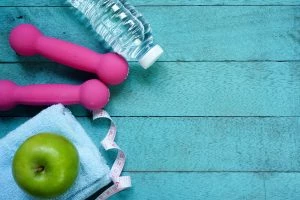Bladder health is a topic rarely discussed, perhaps because the average person doesn’t think about it until they actually get cystitis or some other related illness. Prevention is better than cure, so with that in mind let’s take a look at some of the things you can do to maintain a healthy bladder.
Make sure you drink plenty of water
While a lot of people make it through the day on tea and coffee alone, it’s always recommended to drink lots of water. One way you can tell whether or not you’re well hydrated is from the colour of your urine, which should be a pale yellow comparable to lemonade, anything darker and there’s a good chance you’re dehydrated.
Do pelvic floor exercises
Pelvic floor exercises, also known as Kegel exercises, can help you to hold urine in the bladder by strengthening the muscles extending from the inside of the pubic bone to the anus and covering the area around the vagina, urethra, and rectum.

Pelvic floor exercises and drinking plenty of water will help you maintain a healthy bladder.
Use the bathroom at least once every 4 hours and urinate after sex
This might not be the first thing that springs to mind when it comes to bladder health, but making sure you use the bathroom at least every 3 to 4 hours is good practice because holding urine in your bladder for too long can weaken your bladder muscles and make a bladder infection more likely.
Not properly emptying the bladder when you do go to the toilet can also lead to infection. Make sure you’re in a relaxed position while urinating. For women, hovering over the toilet seat may make it hard to relax, so it is best to sit on the toilet seat. Women should also wipe from front to back after a bowel movement to keep bacteria from getting into the urethra.
Both men and women should urinate after sex because this helps to flush away bacteria that may have entered the urethra during intercourse.
Exercise regularly and maintain a healthy diet
It goes without saying that a whole host of health problems are associated with obesity, and even your bladder can suffer if you’re carrying too much extra weight. Being overweight can weaken your pelvic floor muscles, and the pressure fatty tissue puts on the bladder can cause incontinence. These symptoms can improve, and often clear up completely when people get down to a healthy weight.
Exercising more and eating a healthy diet will also help to prevent constipation, which doesn’t just affect your bowels. When the bowel doesn’t empty properly it can swell up and push down on the bladder. Eating plenty of high fibre foods (such as whole grains, vegetables, and fruits) and drinking plenty of water will help.

Drink less alcohol and eat more healthily for a healthier bladder.
Lower your alcohol intake
Cutting down your alcohol intake might be the key if you’re suffering from repeat urinary tract infections (UTIs). Studies have found that light to moderate alcohol consumption is associated with low UTI probability, but heavy alcohol consumption actually increases the likelihood of contracting a UTI.
Plenty of people in the UK don’t realise that they’re drinking excessive amounts every week, because it’s such a big part of socialising. Keeping a track of how many units you drink per week can help you identify whether this might be contributing to repeat UTIs and cystitis.
Make sure you properly deal with cystitis
Cystitis is an inflammation of the bladder which is typically caused by a urine infection. Men are less likely to get cystitis than women, and around half of the female population will get a urinary tract infection such as cystitis at some point in their lifetime.
Symptoms can include:
- Feeling as if you need to pass urine just after you’ve already gone to the toilet
- Needing to pass urine frequently
- Burning or stinging feeling when you urinate. Women sometimes describe this as feeling like they are ‘peeing broken glass’.
Other, less frequent symptoms of cystitis include blood in the urine, fatigue and experiencing discomfort in the stomach area. Your urine may also become cloudy and more pungent, but this isn’t necessarily an indication of cystitis without any of the other symptoms listed above.
Sometimes cystitis will clear up on its own, but if you’re not seeing any improvement after about 3 days, it might be advisable to take a course of antibiotics. The main danger associated with untreated UTIs is that the infection may spread from the bladder to one or both kidneys, which could potentially cause permanent damage.
Nitrofurantoin is highly effective in in the treatment of UTIs in females. It is now considered as the first line treatment for uncomplicated cystitis and your symptoms should improve within two days of starting treatment.
You can order Nitrofurantoin online here at PostMyMeds. All you need to do is fill out a short online consultation form and our pharmacists will make sure it is dispatched as soon as possible. Depending on the delivery option you choose, you can have your medication in as little as 24 hours.





